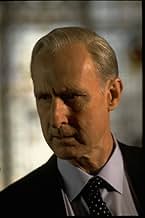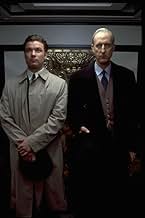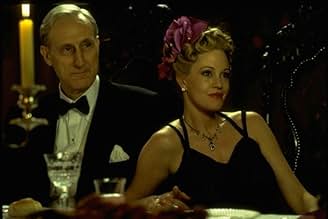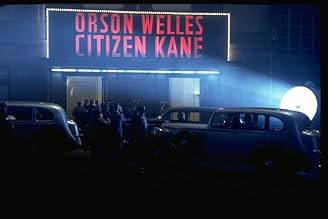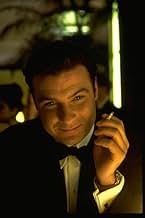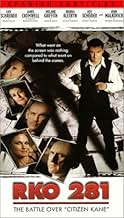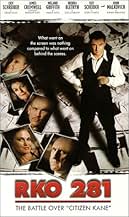IMDb-BEWERTUNG
7,0/10
6642
IHRE BEWERTUNG
Füge eine Handlung in deiner Sprache hinzuOrson Welles produces his greatest film, Citizen Kane (1941), despite the opposition of the film's de facto subject, William Randolph Hearst.Orson Welles produces his greatest film, Citizen Kane (1941), despite the opposition of the film's de facto subject, William Randolph Hearst.Orson Welles produces his greatest film, Citizen Kane (1941), despite the opposition of the film's de facto subject, William Randolph Hearst.
- Regie
- Drehbuch
- Hauptbesetzung
- 3 Primetime Emmys gewonnen
- 15 Gewinne & 28 Nominierungen insgesamt
Empfohlene Bewertungen
I saw it as an introduction in the universe of "Citizen Kane". Its birth, its battles, its price, secrets and victory premises. A powerful film and a great portrait of Orson Welles. And, sure, admirable performances, first - James Cromwell. A film about clashes and power and cynical fights. Maybe, about victories. Sure, it has many sins and, after its end, it is real easy to say than the idea deserves to be better used. But it represents more than a decent film and the work of Liev Schreiber is enough for remind the energy , force and ways of Orson Welles.
Very interesting movie about the battle to get Citizen Kane made has carved out a tricky niche for itself; the movie is going to be most interesting to fans of Welles and Kane, and those people are going to have such specific expectations about what the movie should be that they can't be satisfied.
I see a number of reviews here complaining that this movie doesn't show why Kane was a great movie, but that's not the movie that was being made. It is a short movie about a specific struggle, with brief glimpses into the filming, and unless it had been titled, "RKO 281: The Making of Citizen Kane," you can't fault it for not spending an hour on Welles innovations.
The film is entertaining, Schreiber is a good Welles and Malkovitch is also quite good. I note people also complain that the movie isn't all that accurate. I do wish the film had done a better job with Marian Davies, as one hears her described as fantastically charming and loved by Hollywood (it has been said that Welles' flaying of Davies did more to bring out the knives of the Hollywood press than his portrayal of Hearst). But come on, how can one complain about liberties taking with reality in a movie made about Welles, who loved taking liberties with reality?
I see a number of reviews here complaining that this movie doesn't show why Kane was a great movie, but that's not the movie that was being made. It is a short movie about a specific struggle, with brief glimpses into the filming, and unless it had been titled, "RKO 281: The Making of Citizen Kane," you can't fault it for not spending an hour on Welles innovations.
The film is entertaining, Schreiber is a good Welles and Malkovitch is also quite good. I note people also complain that the movie isn't all that accurate. I do wish the film had done a better job with Marian Davies, as one hears her described as fantastically charming and loved by Hollywood (it has been said that Welles' flaying of Davies did more to bring out the knives of the Hollywood press than his portrayal of Hearst). But come on, how can one complain about liberties taking with reality in a movie made about Welles, who loved taking liberties with reality?
The key to enjoying this film is in being able to divorce yourself from the idea that this is an accurate representation of the making of Citizen Kane. RKO 281 as a stand-alone film is not bad, though the short running time left me feeling like I'd only seen the primary colors of what could've been a rich piece of fiction.
And it does feel more like fiction than truth.
Watching RKO 281 as a Welles enthusiast was a struggle. Welles himself was such a unique *presence*, a magician in more ways than one, and Liev Schreiber just doesn't evoke the god-like charisma and fury that were manifestations of Welles' particular genius. I would've preferred Vincent D'Onofrio (who pulled off an excellent Welles in Ed Wood after only two weeks of preparation) or even Oliver Platt. It is important to get the "character" of Welles RIGHT in a movie about his masterpiece. If RKO 281 failed egregiously on any level, it's this one.
Though this film is about the MAKING of Citizen Kane, it doesn't address why Citizen Kane had such an impact later in its life. We know that Welles had to fight very hard to save his picture against a variety of political agendas. However, a hard-won battle does not a classic film make...on its own. The only clues we get from RKO character Welles are his passionate and other-worldly exclamations along the lines of, "I just KNOW this is the MOMENT for this story!--Everything I AM is in this film!", etc. It's too mystical for me, and I think it does an injustice to the efforts of Welles and his collaborators to suggest that it was simply the luck (and maliciousness towards Hearst) of a spoiled boy wonder that made what is widely considered to be the best movie of all time.
Welles was in a unique position during that era. He had carte blanche in the movie studios--a status unprecedented before or since--and had the means to create his vision fully to his specifications. Getting the picture *released* was nothing short of a miracle, however, and I think it would've been interesting to dive into yet another layer of what Citizen Kane represents: Art for Art's sake. It's heartbreaking to note that Welles' subsequent film The Magnificent Ambersons was butchered beyond recognition by the studio--those who were fortunate enough to view Welles original (and now lost) cut thought that Ambersons was his true masterpiece, that Citizen Kane was merely a warm-up (!!!). Can you just imagine what this man could've accomplished if only...?
Which brings me to William Randolph Hearst. RKO 281 barely scratches the surface of how powerful Hearst was at the time. The residual effects of his attempt to stop Citizen Kane's release were felt by the film industry (and by Welles in particular) for many years after, and I would've liked to see the nature of this confrontation more clearly.
I've often said that Citizen Kane was Orson Welles' bane and salvation, for we see in hindsight that he sacrificed himself (and ultimately his future)
to earn a beautiful and tragic place in cinematic history. Overall, I wanted an edgier, darker, and more complex account of RKO 281. If I remove all pre-conceived notions and expectations, I find that this docudrama is interesting and fun to watch, but ultimately, I cannot help being drawn back to what made this 1999 film possible: the tumultuous triumph of a long-shot movie as envisioned by a temperamental, inexperienced genius. There are many shadowy folds to the real story of Citizen Kane, and RKO 281 feels like a bowl of plastic fruit in comparison.
And it does feel more like fiction than truth.
Watching RKO 281 as a Welles enthusiast was a struggle. Welles himself was such a unique *presence*, a magician in more ways than one, and Liev Schreiber just doesn't evoke the god-like charisma and fury that were manifestations of Welles' particular genius. I would've preferred Vincent D'Onofrio (who pulled off an excellent Welles in Ed Wood after only two weeks of preparation) or even Oliver Platt. It is important to get the "character" of Welles RIGHT in a movie about his masterpiece. If RKO 281 failed egregiously on any level, it's this one.
Though this film is about the MAKING of Citizen Kane, it doesn't address why Citizen Kane had such an impact later in its life. We know that Welles had to fight very hard to save his picture against a variety of political agendas. However, a hard-won battle does not a classic film make...on its own. The only clues we get from RKO character Welles are his passionate and other-worldly exclamations along the lines of, "I just KNOW this is the MOMENT for this story!--Everything I AM is in this film!", etc. It's too mystical for me, and I think it does an injustice to the efforts of Welles and his collaborators to suggest that it was simply the luck (and maliciousness towards Hearst) of a spoiled boy wonder that made what is widely considered to be the best movie of all time.
Welles was in a unique position during that era. He had carte blanche in the movie studios--a status unprecedented before or since--and had the means to create his vision fully to his specifications. Getting the picture *released* was nothing short of a miracle, however, and I think it would've been interesting to dive into yet another layer of what Citizen Kane represents: Art for Art's sake. It's heartbreaking to note that Welles' subsequent film The Magnificent Ambersons was butchered beyond recognition by the studio--those who were fortunate enough to view Welles original (and now lost) cut thought that Ambersons was his true masterpiece, that Citizen Kane was merely a warm-up (!!!). Can you just imagine what this man could've accomplished if only...?
Which brings me to William Randolph Hearst. RKO 281 barely scratches the surface of how powerful Hearst was at the time. The residual effects of his attempt to stop Citizen Kane's release were felt by the film industry (and by Welles in particular) for many years after, and I would've liked to see the nature of this confrontation more clearly.
I've often said that Citizen Kane was Orson Welles' bane and salvation, for we see in hindsight that he sacrificed himself (and ultimately his future)
to earn a beautiful and tragic place in cinematic history. Overall, I wanted an edgier, darker, and more complex account of RKO 281. If I remove all pre-conceived notions and expectations, I find that this docudrama is interesting and fun to watch, but ultimately, I cannot help being drawn back to what made this 1999 film possible: the tumultuous triumph of a long-shot movie as envisioned by a temperamental, inexperienced genius. There are many shadowy folds to the real story of Citizen Kane, and RKO 281 feels like a bowl of plastic fruit in comparison.
If you are into vintage movies, vintage America and conspiracy theories, then this is an entertainment for you.
Many other reviews here have outlined the strengths and weaknesses of the film re the truth about the making of Kane, and the relative attributions of credit, blame and opprobrium. I'd like to inject a good word for Roy Scheider's portrayal of RKO boss George Schaefer: His character's struggle to find the right balance between keeping his east coast money men happy, his obvious liking for Welles and the desire to make good movies is very well portrayed.
Something I really enjoyed was the portrayal of Welles' and Mank's visit to the Hearst Castle at San Simeon, California. That is a fascinating place, which saw so many famous and talented people visit during Hearst's time there. There's a movie about the lifetime of that place to be made by someone, though I don't think anyone has ever attempted it? Apparently they didn't use the real location for RKO281 - a lot of it seems to have been done in London. Was that cost, or did the Hearst Castle trustees refuse....? Anyway, if you're up for a good tale woven around some known facts, but not sticking to them too tightly, take the RKO281 ride, you'll have fun. Just don't let it become your true picture of Mr Welles, Mr Hearst or (most of all) Mr Mankiewicz.
Many other reviews here have outlined the strengths and weaknesses of the film re the truth about the making of Kane, and the relative attributions of credit, blame and opprobrium. I'd like to inject a good word for Roy Scheider's portrayal of RKO boss George Schaefer: His character's struggle to find the right balance between keeping his east coast money men happy, his obvious liking for Welles and the desire to make good movies is very well portrayed.
Something I really enjoyed was the portrayal of Welles' and Mank's visit to the Hearst Castle at San Simeon, California. That is a fascinating place, which saw so many famous and talented people visit during Hearst's time there. There's a movie about the lifetime of that place to be made by someone, though I don't think anyone has ever attempted it? Apparently they didn't use the real location for RKO281 - a lot of it seems to have been done in London. Was that cost, or did the Hearst Castle trustees refuse....? Anyway, if you're up for a good tale woven around some known facts, but not sticking to them too tightly, take the RKO281 ride, you'll have fun. Just don't let it become your true picture of Mr Welles, Mr Hearst or (most of all) Mr Mankiewicz.
8hbs
I didn't know the history of the making of Citizen Kane, and while I enjoyed this movie quite a bit, I still doubt that I know much about it. The movie is attractive, I imagine that it's more or less factually correct, and the cast is generally good, but it doesn't feel "real". Hardly anything is ever as black and white as most of the movie, and even more to the point, the character doesn't manage to capture any of the "zing" that Wells had even as an old man. It's fun, but don't expect too much...
Wusstest du schon
- WissenswertesThe film shows RKO production chief George Schaefer announcing to Orson Welles and Herman J. Mankiewicz that he has lost his job on the very day of the opening of Citizen Kane (1941) in May 1941. In fact, Schaefer did not get fired until late in the following year, and this was less because he had promoted the film career of Orson Welles than because almost all the films RKO had made during his tenure had been flops.
- PatzerIn 1940, Disney was not the major studio it was today. It had few major releases by that date, all animated and all of which were released through other distributors. The meeting of studio chiefs depicted in the movie probably did not take place- certainly not in the form shown- but even if it had, Walt Disney would probably not have been invited. (Samuel Goldwyn, also shown as present, had sold his share in MGM to Louis Mayer years earlier, but was still a major producer.)
- Zitate
Orson Welles: I expected better of you, Mank.
Herman Mankiewicz: Me too, but I got used to it.
- Crazy CreditsEpilogue: "Citizen Kane was released in 1941 to critical acclaim and box office indifference. William Randolph Hearst gradually withdrew from public life. Marion Davies continued to live with him as his mistress. Until his death in 1951, Hearst never permitted a single advertisement or review of Citizen Kane in any of his newspapers. Orson Welles struggled yet succeeded in making films for the rest of his life, including The Magnificent Ambersons, Touch of Evil and Chimes at Midnight. He died in 1985. Citizen Kane is widely considered the greatest American film ever made."
- VerbindungenFeatured in The 57th Annual Golden Globe Awards (2000)
- SoundtracksI Can't Get Started
Written by Ira Gershwin and Vernon Duke
Performed by Bunny Berigan
Courtesy of The RCA Records Label of BMG Entertainment
Top-Auswahl
Melde dich zum Bewerten an und greife auf die Watchlist für personalisierte Empfehlungen zu.
Details
- Erscheinungsdatum
- Herkunftsländer
- Sprache
- Auch bekannt als
- Die Legende - Der Kampf um Citizen Kane
- Drehorte
- St. Pancras Renaissance Hotel London, Euston Road, London, Greater London, England, Vereinigtes Königreich(staircase at Hearst Castle)
- Produktionsfirmen
- Weitere beteiligte Unternehmen bei IMDbPro anzeigen
Box Office
- Budget
- 12.000.000 $ (geschätzt)
- Laufzeit1 Stunde 26 Minuten
- Farbe
- Sound-Mix
- Seitenverhältnis
- 16:9
Zu dieser Seite beitragen
Bearbeitung vorschlagen oder fehlenden Inhalt hinzufügen

Oberste Lücke
By what name was Citizen Kane - Die Hollywood-Legende (1999) officially released in India in English?
Antwort

